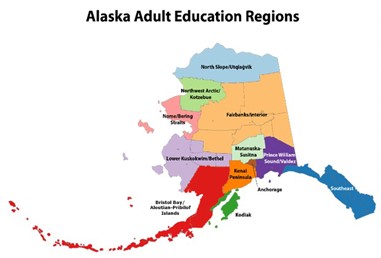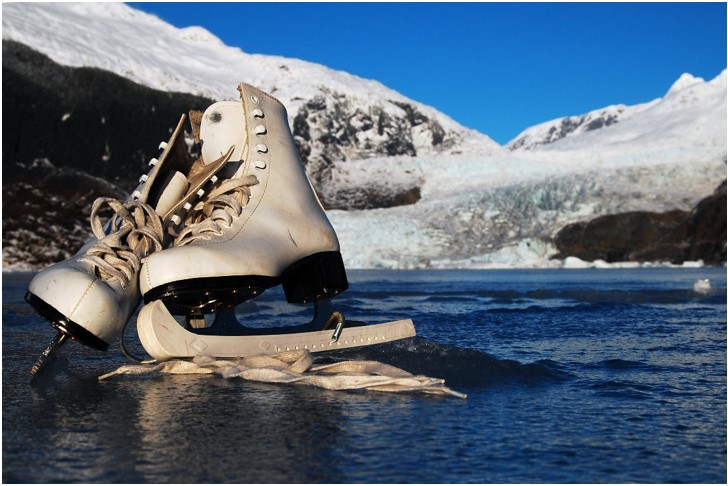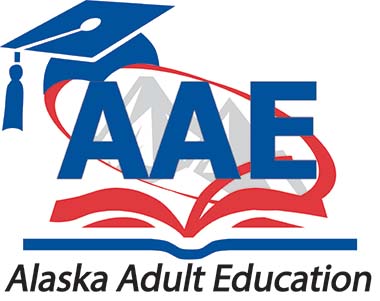AAE Grant Resources
Adult Education grants are administered by the U.S. Department of Education, in accordance with requirements set forth in the Workforce Innovation and Opportunity Act (WIOA) (Public Law 113-128), Title II-Adult Education and Family Literacy Act (AEFLA) (34 CFR Part §463); Uniform Administrative Requirements, Cost Principles, and Audit Requirements for Federal Awards (2 CFR Part 200); and Education Department General Administrative Regulations (EDGAR) (34 CFR Subtitle A, Parts 75-99).
Grants are also administered in accordance with the State of Alaska Administrative Codes (8 ACC 99.010-99.200).
Program activities and accountability measures under WIOA are conducted according to Alaska's WIOA Combined State Plan.
The State of Alaska requires grantees must be able to provide adult education and literacy services at a minimum of thirty hours, four days per week, and for at least nine months per year.
Alaska programs are required to provide:
- Adult education;
- English language acquisition activities;
- Literacy;
- Workplace adult education and literacy activities;
- Digital literacy (State Requirement).
Programs may offer the following additional activities:
- Family literacy activities;
- Integrated English literacy and civics education;
- Workforce preparation activities; or
- Integrated education and training.
Grants are awarded to twelve regional programs across the state.

Two additional grants will be competed statewide; one for Integrated English Literacy and Civics Education (IELCE) and one for AAE services to be offered within the Department of Corrections’ (DOC) institutional centers.
Adult Education Grant Requirements
Adult Education grants provide instructional programs to learners:
- who have attained 16 years of age, are not enrolled or required to be enrolled in secondary school under state law; and
- who are basic skills deficient, do not have a secondary school diploma or its recognized equivalent and have not achieved an equivalent level of education; or are an English language learner.
Priority of service is required for individuals with barriers to employment as defined by WIOA Sec.3.
Regional grants:
- Assist adults in becoming literate and obtaining the knowledge and skill necessary for employment and economic self-sufficiency.
- Assist adults who are parents or family members to obtain education and skills necessary to become full partners in the educational development of their children and lead to sustainable improvements in economic opportunities for their family.
- Assist adults in attaining secondary school diploma and in the transition to postsecondary education and training, including career pathways.
- Assist immigrants and other individuals who are English language learners in improving their English reading, writing, speaking, and comprehension skills, mathematics skills, and acquiring an understanding of the American system of Government, individual freedom, and the responsibilities of citizenship. (CFR Part 34 §463.1).
The State of Alaska requires instruction is available at all educational functional levels (EFL) (basic skills (NRS Level 1 & 2); pre-secondary education (NRS Level 3 & 4); secondary education (NRS Level 5 & 6); and English as a Second Language (NRS ESL Level 1 - 6)).
Memorandum of Understanding
Nation Reporting System (NRS) for Adult Education
- AEFLA NRS Technical Assistance Guide (November 2024)
- Educational Functioning Level Descriptors
- Measuring Educational Gain In NRS Title 34 Part 462
Office of Career, Technical and Adult Education Guidance
- Adult Education And Family Literacy Act (AEFLA) Regulations
- OCTAE: Workforce Innovation and Opportunity Act
- Policy Guidance and Policy Memoranda
- WIOA Statewide Performance Reports
WIOA Title II Annual Narrative Report

Student Information
- Alaska Adult Education
- General Education Development (GED) Testing
- High School Equivalency Diploma and Transcript Request
AAE CONTACT INFORMATION
Windy Swearingin, AAE/GED Director
Phone:(907) 465-8714
Donna Collins, Education Associate
Phone:(907) 465-4685
Email:ak.adult.ed@alaska.gov

PY2025 - PY2030 Providers
AAE Regions and Grant Opportunities | Organizations |
|---|---|
Anchorage Regional Adult Education Program |
Alaska Literacy Program (ALP) |
Bering Straits/Nome Regional Adult Education Program |
Kawerak, Inc. |
Bristol Bay/Aleutian-Pribilof Islands Regional Adult Education Program |
Southeast Regional Resource Center (SERRC) |
Interior/Fairbanks Regional Adult Education Program |
Literacy Council of Alaska (LCA) |
Kenai Peninsula Regional Adult Education Program |
University of Alaska Anchorage: Kenai Peninsula College |
Kodiak Island Regional Adult Education Program |
University of Alaska Anchorage: Kodiak College |
Lower Kuskokwim/Bethel Regional Adult Education Program |
Southeast Regional Resource Center (SERRC) |
Matanuska-Susitna Adult Education Program |
Alaska Literacy Program (ALP) |
North Slope/Utqiavik Regional Adult Education Program |
Southeast Regional Resource Center (SERRC) |
Northwest Arctic/Kotzebue Regional Adult Education Program |
Northwest Arctic Borough School District, Alaska Technical Center |
Prince William Sound/Valdez Regional Adult Education Program |
University of Alaska Anchorage: Prince William Sound College |
Southeast/Juneau Regional Adult Education Program |
Southeast Regional Resource Center (SERRC) |
Integrated English Literacy and Civics Education (IELCE) Grant |
Alaska Literacy Program (ALP) |
Statewide Correctional Adult Education Grant |
Alaska Department of Corrections (ADOC) |
The Alaska Department of Labor and Workforce Development (DOLWD) awards multi-year AAE grants on a competitive basis. The current grant cycle will run from Program year 2025 to 2030 (July 1, 2025, to June 30, 2031).
last updated: January 2, 2026


